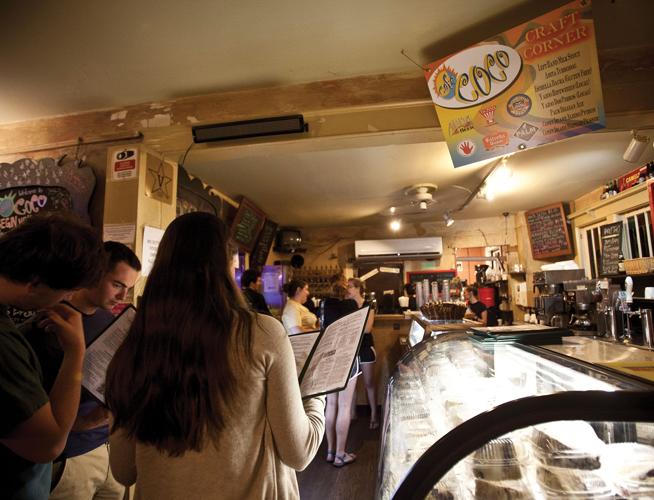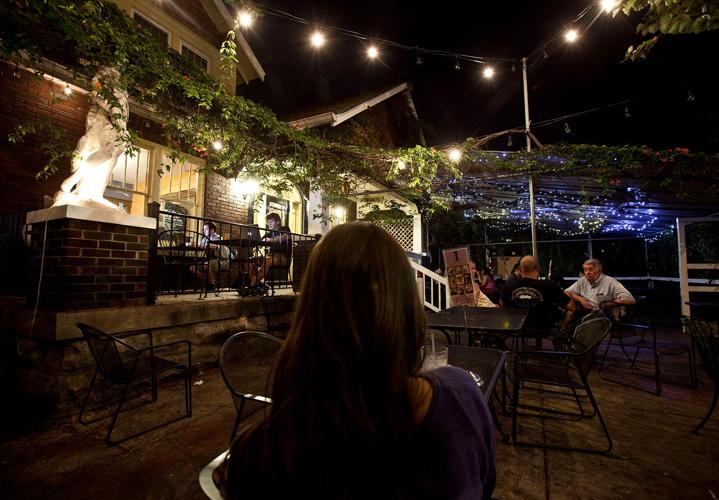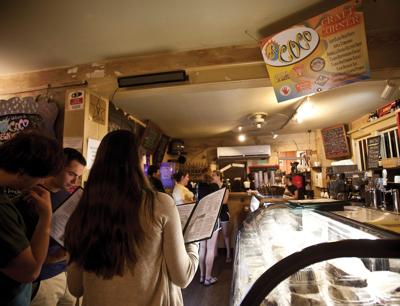Cafe Coco sat at the top of an incline off Elliston Place, rising from the strip known as the Rock Block, its iconic red-and-yellow sign often illuminated against the night sky. And when everything was still as it was meant to be, before Exit/In had to fight for its life and beloved bar the Gold Rush shuttered after 45 years, Cafe Coco — Nashville’s former 24-hour cafe and citadel — was still up and running, filling the rooms of 210 Louise Ave. with its magic.
Many Nashville residents who were around during the fabled cafe’s heyday often use the word “magic” as a descriptor. When I talk to my fellow longtime Nashvillians about it, their hearts open and they tell me how much Cafe Coco means to them. When they describe their experiences there, they often use candid and introspective phrases — phrases like, “Cafe Coco made us feel like Nashville was the city that we lived in, not the city that everyone came here for.”
The building itself, a two-story house in Midtown, was built in 1920. Chuck Cinelli, the founder and primary owner of Cafe Coco for the majority of its 28-year run (he still owns Coco’s Italian Market in West Nashville), knows this because strangers would often tell him of the building’s history. At one point, it was a boarding house, and a man who once rented an upstairs bedroom told him how he and the other tenants would hang out on the roof. The building’s extensive lore predates Cafe Coco’s 1995 opening by 75 years.
“When I got it, someone used it for storage for a frame shop, which I think was across the street,” Cinelli tells the Scene.
Cinelli is warm and inviting, and many of his memories of running Cafe Coco are incredibly vivid. The cafe was open 24 hours — an increasingly rare practice. Even East Side spot The Cobra closes down at 3 a.m. every night.
Speaking to Cinelli, I can’t help but gush about how much love my friends and I have for Coco. I tell him about my first experience there, how after moving to Nashville as a teenager, I wound up making friends with a handful of rebellious prep-school lesbians who took me to Cafe Coco one night. We smoked cigarettes in the back room with an elderly drag queen and two gutter punks with crusty, towering mohawks held together with Elmer’s Glue.
Cinelli, a family man from the Northeast, lights up when I tell him these stories. “I knew it was magical,” he says. “I knew it was important. But at the same time, it was just nothing but hard work.”

Cafe Coco
Cinelli moved to Nashville in his 20s with nothing to lose — Nashville was the midpoint between his hometown of Schenectady, N.Y., and Florida, where his parents had recently retired to. He comes from a long line of hardworking restaurateurs, so opening a place of his own seemed inevitable. He originally opened the cafe under the name Cafe Elliston, but he quickly changed that to Coco (for his grandmother, whose maiden name was Di Cocco) when people confused it with Elliston Place Soda Shop, another Rock Block staple. Chuck initially slept in the basement and rented out his house in East Nashville to make ends meet, but thanks in part to his family history and love for authentic Italian coffee, the cafe was soon a hit, transitioning from late-night hours to 24 hours in less than a year.
It’s hard to pinpoint exactly when Cafe Coco started to get a little weird — the type of old-school-Nashville weird that the cafe eventually epitomized. Maybe it was when eccentric people began showing up on the patio with snakes wrapped around their hands and squirrels in their pockets. Or perhaps it was when patrons actually started sleeping there. (I remind Cinelli of this, how he used to let unhoused youth essentially live at his cafe. He smiles and humbly tells me that sometimes those kids, now adults who found their way, approach him in Kroger and thank him with tears in their eyes.) Or maybe it was the legendary open-mic nights in the back room, the hip-hop shows and poetry slams, or just the way Cafe Coco took on a life of its own. The food was also incredible. (“Nobody could make that turkey Rockefeller at home,” says Cinelli.) Nothing about it felt inauthentic; there were no chrome parts. The lights were never off — the cafe often remained open even on Christmas — and the music never stopped.
I don’t think it ever occurred to us that Cafe Coco would one day turn off its lights for good.
Cinelli eventually sold the cafe in 2020, and subsequent owners attempted to keep it alive. But perhaps due to menu changes and fluctuating hours, it never really recovered. In November 2023, Cafe Coco was permanently closed. The building is now set to house a combination all-day cafe and cocktail bar (Verna) and neighborhood bar (Connie’s Upscale Dive), owned and operated by established food-and-beverage pro Beau Gaultier. Gaultier hopes to open early this summer.
Cinelli attributes the death of Cafe Coco to the internet. He reminds me of how loud it used to be — like a “school cafeteria” — describing how patrons would sit for hours and “geek out on coffee,” not knowing they weren’t supposed to have four shots of espresso at once. It makes me recall how the energy of the cafe was so vibrant that it practically roared.
“And then the internet showed up, and it got quiet.”
A friend once described to Cinelli how Cafe Coco functioned as the internet before there was such a thing. “She said, ‘Chuck, [Cafe Coco] was the internet. That was a server, [because] that’s where people connected.’ It was such a beautiful connotation.”
It is a beautiful connotation because it was through those connections that we learned to be ourselves. “It was for everybody,” Cinelli says. The magic of Cafe Coco was simple: It made Nashville feel like home.







